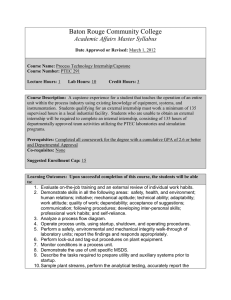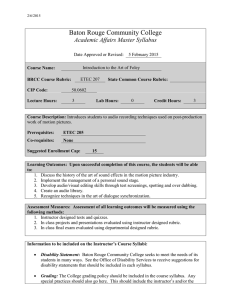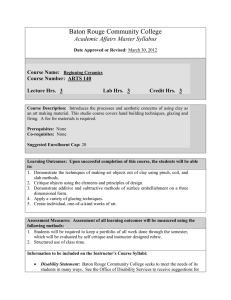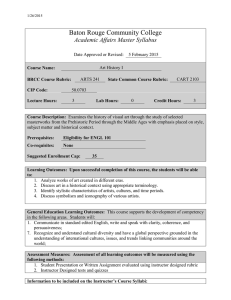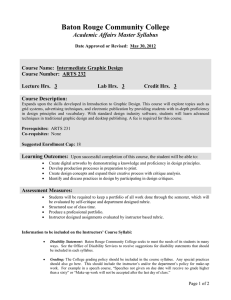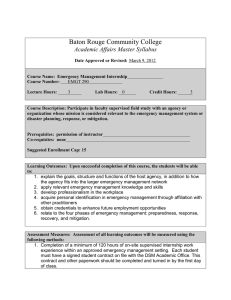Baton Rouge Community College Academic Affairs Master Syllabus
advertisement
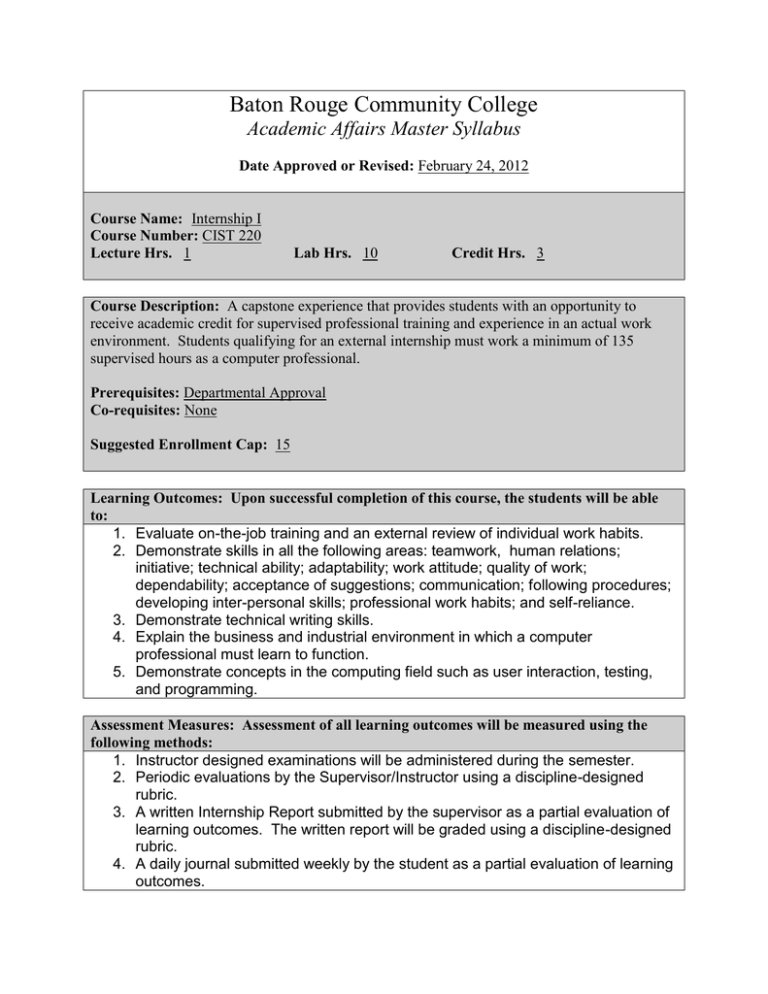
Baton Rouge Community College Academic Affairs Master Syllabus Date Approved or Revised: February 24, 2012 Course Name: Internship I Course Number: CIST 220 Lecture Hrs. 1 Lab Hrs. 10 Credit Hrs. 3 Course Description: A capstone experience that provides students with an opportunity to receive academic credit for supervised professional training and experience in an actual work environment. Students qualifying for an external internship must work a minimum of 135 supervised hours as a computer professional. Prerequisites: Departmental Approval Co-requisites: None Suggested Enrollment Cap: 15 Learning Outcomes: Upon successful completion of this course, the students will be able to: 1. Evaluate on-the-job training and an external review of individual work habits. 2. Demonstrate skills in all the following areas: teamwork, human relations; initiative; technical ability; adaptability; work attitude; quality of work; dependability; acceptance of suggestions; communication; following procedures; developing inter-personal skills; professional work habits; and self-reliance. 3. Demonstrate technical writing skills. 4. Explain the business and industrial environment in which a computer professional must learn to function. 5. Demonstrate concepts in the computing field such as user interaction, testing, and programming. Assessment Measures: Assessment of all learning outcomes will be measured using the following methods: 1. Instructor designed examinations will be administered during the semester. 2. Periodic evaluations by the Supervisor/Instructor using a discipline-designed rubric. 3. A written Internship Report submitted by the supervisor as a partial evaluation of learning outcomes. The written report will be graded using a discipline-designed rubric. 4. A daily journal submitted weekly by the student as a partial evaluation of learning outcomes. 5. Online discussions. 6. Employability or soft skills will be assessed using a soft skills rubric. 7. Completion of a student exit survey. Information to be included on the Instructor’s Course Syllabi: Disability Statement: Baton Rouge Community College seeks to meet the needs of its students in many ways. See the Office of Disability Services to receive suggestions for disability statements that should be included in each syllabus. Grading: The College grading policy should be included in the course syllabus. Any special practices should also go here. This should include the instructor’s and/or the department’s policy for make-up work. For example in a speech course, “Speeches not given on due date will receive no grade higher than a sixty” or “Make-up work will not be accepted after the last day of class.” Attendance Policy: Include the overall attendance policy of the college. Instructors may want to add additional information in individual syllabi to meet the needs of their courses. General Policies: Instructors’ policy on the use of things such as beepers and cell phones and/or hand held programmable calculators should be covered in this section. Cheating and Plagiarism: This must be included in all syllabi and should include the penalties for incidents in a given class. Students should have a clear idea of what constitutes cheating in a given course. Safety Concerns: In some programs this may be a major issue. For example, “No student will be allowed in the safety lab without safety glasses.” General statements such as, “Items that may be harmful to one’s self or others should not be brought to class.” Library/ Learning Resources: Since the development of the total person is part of our mission, assignments in the library and/or the Learning Resources Center should be included to assist students in enhancing skills and in using resources. Students should be encouraged to use the library for reading enjoyment as part of lifelong learning. Expanded Course Outline: I. II. Orientation a. Course Objectives b. Expectations c. Documentation for Internship Project Assignments a. On-the-job training III. Evaluation a. Student portfolio b. Written and oral presentation c. Supervisor evaluation d. Faculty evaluation
